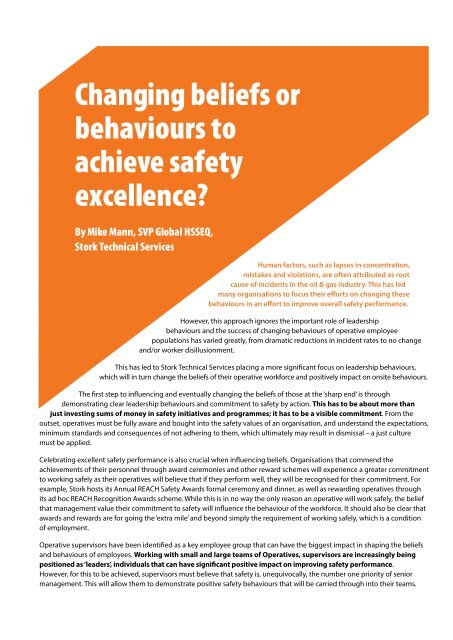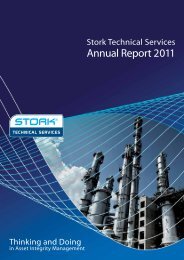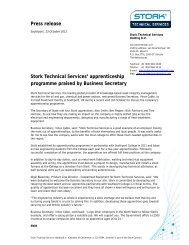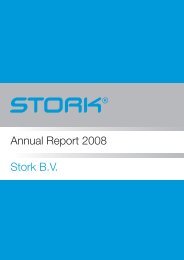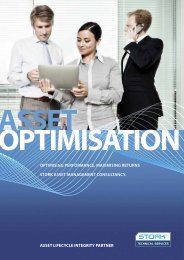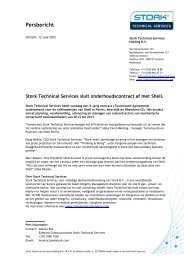Download - Stork Technical Services
Download - Stork Technical Services
Download - Stork Technical Services
Create successful ePaper yourself
Turn your PDF publications into a flip-book with our unique Google optimized e-Paper software.
Changing beliefs or<br />
behaviours to<br />
achieve safety<br />
excellence<br />
By Mike Mann, SVP Global HSSEQ,<br />
<strong>Stork</strong> <strong>Technical</strong> <strong>Services</strong><br />
Human factors, such as lapses in concentration,<br />
mistakes and violations, are often attributed as root<br />
cause of incidents in the oil & gas industry. This has led<br />
many organisations to focus their efforts on changing these<br />
behaviours in an effort to improve overall safety performance.<br />
However, this approach ignores the important role of leadership<br />
behaviours and the success of changing behaviours of operative employee<br />
populations has varied greatly, from dramatic reductions in incident rates to no change<br />
and/or worker disillusionment.<br />
This has led to <strong>Stork</strong> <strong>Technical</strong> <strong>Services</strong> placing a more significant focus on leadership behaviours,<br />
which will in turn change the beliefs of their operative workforce and positively impact on onsite behaviours.<br />
The first step to influencing and eventually changing the beliefs of those at the ‘sharp end’ is through<br />
demonstrating clear leadership behaviours and commitment to safety by action. This has to be about more than<br />
just investing sums of money in safety initiatives and programmes; it has to be a visible commitment. From the<br />
outset, operatives must be fully aware and bought into the safety values of an organisation, and understand the expectations,<br />
minimum standards and consequences of not adhering to them, which ultimately may result in dismissal – a just culture<br />
must be applied.<br />
Celebrating excellent safety performance is also crucial when influencing beliefs. Organisations that commend the<br />
achievements of their personnel through award ceremonies and other reward schemes will experience a greater commitment<br />
to working safely as their operatives will believe that if they perform well, they will be recognised for their commitment. For<br />
example, <strong>Stork</strong> hosts its Annual REACH Safety Awards formal ceremony and dinner, as well as rewarding operatives through<br />
its ad hoc REACH Recognition Awards scheme. While this is in no way the only reason an operative will work safely, the belief<br />
that management value their commitment to safety will influence the behaviour of the workforce. It should also be clear that<br />
awards and rewards are for going the ‘extra mile’ and beyond simply the requirement of working safely, which is a condition<br />
of employment.<br />
Operative supervisors have been identified as a key employee group that can have the biggest impact in shaping the beliefs<br />
and behaviours of employees. Working with small and large teams of Operatives, supervisors are increasingly being<br />
positioned as ‘leaders’, individuals that can have significant positive impact on improving safety performance.<br />
However, for this to be achieved, supervisors must believe that safety is, unequivocally, the number one priority of senior<br />
management. This will allow them to demonstrate positive safety behaviours that will be carried through into their teams.


